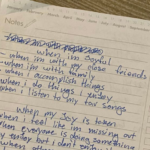As a noun, the definition of joy is a feeling of great pleasure and happiness. As a verb, the definition of joy is rejoice.
My daughter is a joyful person. Well, except for her mornings — it takes a bit to shake off the crabbiness of having to get out of her cozy bed and jump into the day. Perhaps she gets that from me. But once she’s there, she’s there. The typical middle school drama didn’t consume her, and now that she’s in high school, she continues to avoid the junk that tends to drag a teen down. I’ve always described her as joyful. She skips and laughs, sees the good, and is happy when others win.
Now, she certainly has her moments—beyond the morning crabbiness—like any human being. For example, at the dinner table, when we ask her about her day, she shrugs her shoulders and mumbles something incoherent with a clear message that says, “leave me be already. I’m tired, duh!” Still, her general demeanor is that of joy, which fits the definition of joy as a noun, so I wanted to investigate and get curious about what’s in her head and heart.
I started by having her describe when she is joyful. By the way, she happily gave me her time and wrote out her answers while we drove home from school one afternoon. I didn’t even get an eye roll! I handed her a notebook, and she wrote the following:
- When I’m with my close friends
- When I’m with family
- When I accomplish things
- When I do things I enjoy
- When I listen to my favorite songs
The next question was about the opposite. I asked when she feels the absence of joy. She wrote:
- When I feel like I’m missing out
- When everyone is doing something they enjoy but I don’t enjoy it (when others are having fun doing something but I’m not)
- When I don’t feel my best
Those are fascinating answers coming from a 15-year-old. I was impressed with how thoughtful she was about her answers and how similar they were to what I might say. Being with friends and family and doing fun things always bring joy to my heart. And, of course, having FOMO happens to many of us.
I’m all about intention these days. I want to be intentional about how I spend my time and where I put my energy. I am intentional about being present in the moment, whether with you or by myself. I am intentional about my faith, health, and finances. Those are all components of how I feel joy and how my joy can get zapped if I’m not careful.
I wondered if my daughter was intentional — or if that was a grown-up concept that never crossed her mind. I asked her about how she protects her joy. (I fully expected a shoulder shrug.) She quickly put pen to paper and wrote out the following:
- I protect the joy I have with my friends by laughing and being with them when I can
- By enjoying the time I have with them
- Take time to do the things I need to do
- Take time to do things I enjoy
- Listen to music when I can and to bring me joy when I’m sad
- Find the fun in the things I am doing
- Try to have fun or enjoy it and, if I don’t, just find other things about it that are fun
- Listen to music or do things I enjoy or do things that make me feel better
She makes it seem so easy to stay joy-filled, doesn’t she? Her answers made me question if I am — many of us — are overthinking life. Granted, she’s only 15, and life is pretty easy for her. Still, I think there’s a good lesson in here for all of us. Perhaps it really is that easy: Be with friends, find the fun or good in any situation, and listen to music (or take a bath, read a book, go for a walk) to intentionally stay in your joy. Rather than choosing to be upset about a situation or getting sucked into that “woe is me” feeling, we can purposefully find the good and stay in a beautiful state versus one of suffering.
That brings me to thinking about the word joy when used as a verb. The definition is simply “rejoice.” When we actively seek the good, we are rejoicing! Think about how that feels. It automatically makes me feel lighter and brings a smile to my face. Talking about joy as a noun versus a verb isn’t a grammar lesson; it’s a lesson in being intentional with our thoughts, focus, and posture.
Thank you, sweet daughter of mine, for being you and for letting me see the world through your joy-filled eyes. Thank you for letting me share this with the world so we can reset our beliefs around what it takes to feel and experience pleasure and happiness.
After I quizzed my daughter about her joy, I listened to an episode on the Healthy Wealthy and Wise podcast. The host and guest were talking about tapping into our purpose and joy. They offered two suggestions:
- List your joy activities (we are quick to create a business plan or list the tasks that need to be completed instead of listing the non-negotiable activities that bring us joy). Let’s put joy first. Let’s live every moment of every day instead of working on scheduling work.
- Put yourself first. And be confidently okay with that! There is only so far that our schooling and our hustle will carry us before we burn out, so be the superhero to yourself instead of always to/for everyone else.
Here’s to living your joy-filled life, friends.


Good https://dub.sh/LAqZ3qv